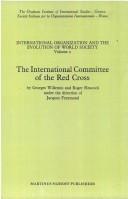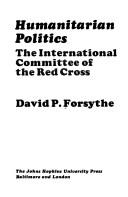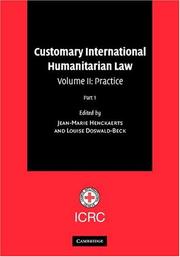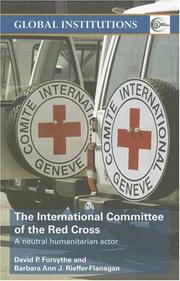| Listing 1 - 10 of 20 | << page >> |
Sort by
|
Book
ISBN: 2940415447 294041548X Year: 2011 Publisher: Graduate Institute Publications
Abstract | Keywords | Export | Availability | Bookmark
 Loading...
Loading...Choose an application
- Reference Manager
- EndNote
- RefWorks (Direct export to RefWorks)
Since the mid-19th century military powers and various writers have tried to define the notion of belligerent occupation and, in particular, the beginning thereof. There are many situations in which a state of occupation is controversial or even denied. When is control so effective that an invasion turns into a state of belligerent occupation? What is the minimum area of a territory that can be occupied; a town, a hamlet, a house or what about a hill taken by the armed forces? This paper examines what seems to be an important gap of the Fourth Geneva Convention: contrary to the Hague Regulations of 1907 it does not provide a definition of belligerent occupation. It is argued that the Fourth Geneva Convention follows its own rules of applicability and that therefore the provisions relative to occupied territories apply in accordance with the “functional beginning” of belligerent occupation approach from the moment that a protected person finds him or herself in the hands of the enemy. Henry Dunant Prize 2010 from the Geneva Academy of International Humanitarian Law and Human Rights (ADH Geneva)
International Law --- Law, Politics & Government --- Treaties, International --- Geneva Convention Fourth (1949) --- belligerent occupation --- protection of civilians --- dispute settlement --- conflict security and peacebuilding --- International Committee of the Red Cross (ICRC) --- humanitarian action
Book
ISBN: 022613153X 9780226131535 1306839173 9781306839174 9780226131221 022613122X 9780226131368 022613136X Year: 2014 Publisher: Chicago : The university of Chicago press,
Abstract | Keywords | Export | Availability | Bookmark
 Loading...
Loading...Choose an application
- Reference Manager
- EndNote
- RefWorks (Direct export to RefWorks)
NGOs set out to save lives, relieve suffering, and service basic human needs. They are committed to serving people across national borders and without regard to race, ethnicity, gender, or religion, and they offer crucial help during earthquakes, tsunamis, wars, and pandemics. But with so many ailing areas in need of assistance, how do these organizations decide where to go-and who gets the aid? In The Good Project, Monika Krause dives into the intricacies of the decision-making process at NGOs and uncovers a basic truth: It may be the case that relief agencies try to help people but, in practical terms, the main focus of their work is to produce projects. Agencies sell projects to key institutional donors, and in the process the project and its beneficiaries become commodities. In an effort to guarantee a successful project, organizations are incentivized to help those who are easy to help, while those who are hardest to help often receive no assistance at all. The poorest of the world are made to compete against each other to become projects-and in exchange they offer legitimacy to aid agencies and donor governments. Sure to be controversial, The Good Project offers a provocative new perspective on how NGOs succeed and fail on a local and global level.
Humanitarian assistance. --- Non-governmental organizations -- History. --- Non-governmental organizations. --- Non-governmental organizations --- Humanitarian assistance --- humanitarian relief, ngos, charity, suffering, poverty, natural disasters, earthquakes, war, tsunamis, pandemic, assistance, donors, pierre bourdieu, humanitarianism, bureaucracy, msf, icrc, nonfiction, politics, political science, sociology, international relations, history, global health, capitalism, rationalization, decision making processes, non profits, funding, projects, success. --- Organisations non gouvernementales. --- Aide humanitaire.
Book
ISBN: 2940600414 Year: 2023 Publisher: Genève : Graduate Institute Publications,
Abstract | Keywords | Export | Availability | Bookmark
 Loading...
Loading...Choose an application
- Reference Manager
- EndNote
- RefWorks (Direct export to RefWorks)
This ePaper explores the endeavours and motivations of the leading figures of the Japanese Red Cross Society, which forms the streams of the Red Cross Movement that get overshadowed in the Eurocentric narrative of its history. Using various primary sources from archives and studying the historical context of the time, the paper highlights how the main protagonists with similar backgrounds to the founders of the International Committee of the Red Cross proactively sought to establish and develop the movement both at the national and international level from 1867 to 1919. Moreover, a close examination of their backgrounds as well as their thoughts as expressed in their writings suggests that their motivations to engage in Red Cross work were multiple and in part, if not entirely, shaped by various needs to fulfil their own desire and sense of obligation. We extend our heartfelt thanks to the Vahabzadeh Foundation for financially supporting the publication of best works by young researchers of the Graduate Institute, giving a priority to those who have been awarded academic prizes for their master’s dissertations.
Asian Studies --- History --- Social Sciences, Interdisciplinary --- International Relations --- action humanitaire --- CICR - Comité international de la Croix Rouge --- coopération internationale --- diplomatie --- droits humains --- histoire sociale --- politique internationale --- relations internationales --- traités --- foreign relations --- State | Nation --- governance --- humanitarian action --- International Committee of the Red Cross (ICRC) --- international law --- non-state actors and civil society --- International relations. --- Coexistence --- Foreign affairs --- Foreign policy --- Foreign relations --- Global governance --- Interdependence of nations --- International affairs --- Peaceful coexistence --- World order --- National security --- Sovereignty --- World politics
Book
ISBN: 9788883333279 8883333276 Year: 2014 Volume: 3 Publisher: Roma: EDUSC,
Abstract | Keywords | Export | Availability | Bookmark
 Loading...
Loading...Choose an application
- Reference Manager
- EndNote
- RefWorks (Direct export to RefWorks)
International Committee of the Red Cross --- Catholic Church --- Church of Rome --- Roman Catholic Church --- Katholische Kirche --- Katolyt︠s︡ʹka t︠s︡erkva --- Römisch-Katholische Kirche --- Römische Kirche --- Ecclesia Catholica --- Eglise catholique --- Eglise catholique-romaine --- Katolicheskai︠a︡ t︠s︡erkovʹ --- Chiesa cattolica --- Iglesia Católica --- Kościół Katolicki --- Katolicki Kościół --- Kościół Rzymskokatolicki --- Nihon Katorikku Kyōkai --- Katholikē Ekklēsia --- Gereja Katolik --- Kenesiyah ha-Ḳatolit --- Kanisa Katoliki --- כנסיה הקתולית --- כנסייה הקתולית --- 가톨릭교 --- 천주교 --- International Red Cross Committee --- Comité international de secours aux militaires blessés --- Comité international de la Croix-Rouge --- Internationales Komitee vom Roten Kreuz --- IKRK --- CICR --- DES --- Red Cross, International Committee of the --- Red Cross. --- I.C.R.C. --- ICRC --- I.K.R.K. --- C.I.C.R. --- D.E.S. --- Comité Internacional de la Cruz Roja --- Comisión Internacional de la Cruz Roja --- Diethnes Komitato tou Erythrou Staurou --- Starptautiskā Sarkanā Krusta komiteja --- Guddiga Caalamiga ah ee Laanqayrta Cas --- Guddiga Laanqayrta Cas ee Caalamiga --- CICV --- ʼĀhgurāwi komité qayeḥ masqal --- Comitetul Internațional al Crucii Roșii --- Lajnah al-Dawlīyah lil-Ṣalīb al-Aḥmar --- Guddiga Caalamiga ee Laanqeyrta Cas --- Mezhdunarodnyĭ komitet krasnogo kresta --- MKKK --- 紅十字國際委員會 --- Kumītah-i Bayn al-Milalī-i Ṣalīb-i Surkh --- کميته بين المللى صليب سرخ --- Uluslararası Kızılhaç Komitesi --- Khana Kammakān Kāchāt Rawāng Prathēt --- History --- Foreign relations --- International committee of the Red Cross --- Comitato internazionale della Croce Rossa

ISBN: 9024730643 9789024730643 9004639659 1134281099 1280858818 9786610858811 020348021X 9780203480212 9780415346139 0415346134 0415341515 9780415341516 Year: 2007 Volume: 2 Publisher: London: Routledge,
Abstract | Keywords | Export | Availability | Bookmark
 Loading...
Loading...Choose an application
- Reference Manager
- EndNote
- RefWorks (Direct export to RefWorks)
The International Committee of the Red Cross (ICRC) has a complex position in international relations, being the guardian of international humanitarian law but often acting discretely to advance human dignity. Treated by most governments as if it were an inter-governmental organization, the ICRC is a non-governmental organization, all-Swiss at the top, and it is given rights and duties in the 1949 Geneva Conventions for Victims of War. Written by two formidable experts in the field, this book analyzes international humanitarian action as practiced by the International Red Cross, expl
International Committee of the Red Cross --- 341.33 --- 614.88 --- 614.885 <100> --- Oorlogsgewonden. Oorlogszieken. Conventie van Geneve. Rood Kruis. Militair hospitaal. Hospitaalschip --- First aid. Casualty and ambulance services --- International Committee of the Red Cross. --- International Red Cross Committee --- Comité international de secours aux militaires blessés --- Comité international de la Croix-Rouge --- Internationales Komitee vom Roten Kreuz --- IKRK --- CICR --- DES --- Red Cross, International Committee of the --- Red Cross. --- I.C.R.C. --- ICRC --- I.K.R.K. --- C.I.C.R. --- D.E.S. --- Comité Internacional de la Cruz Roja --- Comisión Internacional de la Cruz Roja --- Diethnes Komitato tou Erythrou Staurou --- Starptautiskā Sarkanā Krusta komiteja --- Guddiga Caalamiga ah ee Laanqayrta Cas --- Guddiga Laanqayrta Cas ee Caalamiga --- CICV --- ʼĀhgurāwi komité qayeḥ masqal --- Comitetul Internațional al Crucii Roșii --- Lajnah al-Dawlīyah lil-Ṣalīb al-Aḥmar --- Guddiga Caalamiga ee Laanqeyrta Cas --- Mezhdunarodnyĭ komitet krasnogo kresta --- MKKK --- 紅十字國際委員會 --- Kumītah-i Bayn al-Milalī-i Ṣalīb-i Surkh --- کميته بين المللى صليب سرخ --- Uluslararası Kızılhaç Komitesi --- Khana Kammakān Kāchāt Rawāng Prathēt --- 614.88 First aid. Casualty and ambulance services --- 341.33 Oorlogsgewonden. Oorlogszieken. Conventie van Geneve. Rood Kruis. Militair hospitaal. Hospitaalschip --- International committee of the Red Cross. --- Comitato internazionale della Croce Rossa --- Humanitarian assistance. --- Humanitarian assistance --- International relief

ISBN: 0801819830 9780801819834 Year: 1977 Publisher: Baltimore: Johns Hopkins University press,
Abstract | Keywords | Export | Availability | Bookmark
 Loading...
Loading...Choose an application
- Reference Manager
- EndNote
- RefWorks (Direct export to RefWorks)
War --- Protection of civilians. --- International Committee of the Red Cross. --- 614.88 --- -#SBIB:327.7H130 --- #SBIB:327.5H21 --- Armed conflict (War) --- Conflict, Armed (War) --- Fighting --- Hostilities --- Wars --- International relations --- Military art and science --- Peace --- First aid. Casualty and ambulance services --- Protection of civilians --- Verenigde Naties: gespecialiseerde instellingen (UNESCO, FRO, OIT, ...) --- Vrede – oorlog, oorlogssituaties --- International Red Cross Committee --- Comité international de secours aux militaires blessés --- Comité international de la Croix-Rouge --- Internationales Komitee vom Roten Kreuz --- IKRK --- CICR --- DES --- Red Cross, International Committee of the --- Red Cross. --- I.C.R.C. --- ICRC --- I.K.R.K. --- C.I.C.R. --- D.E.S. --- Comité Internacional de la Cruz Roja --- Comisión Internacional de la Cruz Roja --- Diethnes Komitato tou Erythrou Staurou --- Starptautiskā Sarkanā Krusta komiteja --- Guddiga Caalamiga ah ee Laanqayrta Cas --- Guddiga Laanqayrta Cas ee Caalamiga --- CICV --- ʼĀhgurāwi komité qayeḥ masqal --- Comitetul Internațional al Crucii Roșii --- Lajnah al-Dawlīyah lil-Ṣalīb al-Aḥmar --- Guddiga Caalamiga ee Laanqeyrta Cas --- Mezhdunarodnyĭ komitet krasnogo kresta --- MKKK --- 紅十字國際委員會 --- Kumītah-i Bayn al-Milalī-i Ṣalīb-i Surkh --- کميته بين المللى صليب سرخ --- Uluslararası Kızılhaç Komitesi --- Khana Kammakān Kāchāt Rawāng Prathēt --- 614.88 First aid. Casualty and ambulance services --- #SBIB:327.7H130 --- War (International law) --- International committee of the Red Cross. --- Comitato internazionale della Croce Rossa --- War - Protection of civilians.
Book
ISBN: 3034320388 3035109052 9783035109054 Year: 2016 Publisher: Bern, Berlin, Bruxelles, Frankfurt am Main, New York, Oxford, Wien Peter Lang International Academic Publishing Group
Abstract | Keywords | Export | Availability | Bookmark
 Loading...
Loading...Choose an application
- Reference Manager
- EndNote
- RefWorks (Direct export to RefWorks)
During Nigeria’s decolonization, Swiss traders and diplomats, aware of the exceptional potential for growth, attentively observed this new market for possible business opportunities. This book focuses on multinational companies, diplomats, development cooperation actors and public opinion: it analyses underlying motivations and means, as well as the implications of their activities. Analyser les rapports économiques et diplomatiques entre le Nigeria et la Suisse revient à se pencher sur des mécanismes peu connus de la globalisation: ceux d’une relation Nord-Sud entre deux puissances moyennes et non coloniales. Pays le plus peuplé d’Afrique, le Nigeria semblait en passe de devenir, à l’aube de son indépendance, une puissance économique continentale. La Suisse, comme d’autres pays, espérait profiter de ce vaste marché promis à une expansion rapide. Entreprises multinationales, diplomates et coopérants au développement sont au centre de cet ouvrage, qui s’interroge sur les motivations, les moyens mis en œuvre et les impacts des activités de chacun. S’y ajoutent des citoyens suisses de tous âges et de tous milieux qui, bouleversés par les images télévisées d’enfants squelettiques durant la « Guerre du Biafra » en 1968, entreprirent des collectes de fonds et firent pression sur leur gouvernement pour qu’il intervienne. Ce livre donne une profondeur éclairante aux relations Suisse – Nigeria, récemment médiatisées sur leurs aspects migratoires, ou sur les pratiques opaques de négociants en pétrole établis en Suisse.
Economic History --- Business & Economics --- Economic assistance, Swiss --- Corporations, Swiss --- Switzerland --- Nigeria --- Foreign relations --- Foreign public opinion, Swiss. --- Swiss corporations --- Swiss economic assistance --- Nigeria (Federation) --- Federation of Nigeria --- Nigerija --- Federal Republic of Nigeria --- Colony and Protectorate of Nigeria --- Republic of Nigeria --- Federal Military Government (Nigeria) --- Nai-chi-li-ya --- Nigerii︠a︡ --- Bundesrepublik Nigeria --- Jamhuriyar Taraiyar Nijeriya --- Ọ̀hàńjíkọ̀ Ọ̀hànézè Naìjíríyà --- Orílẹ̀-èdè Olómìniira Àpapọ̀ Nàìjíríà --- ナイジェリア --- Naijeria --- ניגריה --- Nigeryah --- Zvicra --- Confédération suisse --- Eidgenossenschaft (Swiss Confederation) --- Everlasting League --- Four Forest Cantons --- Helvetic Confederation --- Lega elvetica --- Schweiz --- Suisse --- Svizzera --- Helvetia --- Confédération de huit cantons --- Confederatio Helvetica --- Zwitserland --- Shveytsʻaria --- Suiza --- Vier Waldstätte --- Swiss Confederation --- Schweizerische Eidgenossenschaft --- Shveĭt︠s︡arii︠a︡ --- Sŭwisŭ --- Shṿaits --- Schweizerische Eidtgenossenschaft --- Confederazione svizzera --- Swisserland --- Sviṭzaralaiṇḍa --- Confederaziun svizra --- Svizra --- CH (Switzerland) --- Sveitsi --- スイス --- Suisu --- Helvetic Republic --- foreign aid --- croix-rouge --- basel mission --- alusuisse --- nigeria --- public opinion --- diplomacy --- arms --- business --- switzerland --- nestlé --- humanitaire --- decolonization --- mediation --- humanitarian aid --- médiation --- development --- colonization --- guerre civile du nigeria --- trente glorieuses --- armes --- biafra --- pétrole --- décolonisation --- économie --- afrique --- oerlikon-bührle --- british empire --- propaganda --- diplomatie --- coopération au développement --- propagande --- opinion publique --- utc --- commerce --- trade --- mission de bâle --- suisse --- colonisation --- oil --- cicr --- panalpina --- icrc --- empire britannique --- nigerian civil war --- red-cross

ISBN: 0521539250 Year: 2005 Publisher: Cambridge : Cambridge university press,
Abstract | Keywords | Export | Availability | Bookmark
 Loading...
Loading...Choose an application
- Reference Manager
- EndNote
- RefWorks (Direct export to RefWorks)
Humanitarian law. --- Humanitarian law --- Humanitarian conventions --- International humanitarian law --- War (International law) --- International Committee of the Red Cross. --- ICRC --- International committee of the Red Cross. --- ʼĀhgurāwi komité qayeḥ masqal --- Comité international de secours aux militaires blessés --- Comité international de la Croix-Rouge --- CICR --- C.I.C.R. --- CICV --- Comisión Internacional de la Cruz Roja --- Comitato internazionale della Croce Rossa --- Comité Internacional de la Cruz Roja --- Comitetul Internațional al Crucii Roșii --- D.E.S. --- DES --- Diethnes Komitato tou Erythrou Staurou --- Guddiga Caalamiga ah ee Laanqayrta Cas --- Guddiga Caalamiga ee Laanqeyrta Cas --- Guddiga Laanqayrta Cas ee Caalamiga --- I.C.R.C. --- I.K.R.K. --- IKRK --- International Red Cross Committee --- Internationales Komitee vom Roten Kreuz --- Khana Kammakān Kāchāt Rawāng Prathēt --- Kumītah-i Bayn al-Milalī-i Ṣalīb-i Surkh --- Lajnah al-Dawlīyah lil-Ṣalīb al-Aḥmar --- Mezhdunarodnyĭ komitet krasnogo kresta --- MKKK --- Red Cross. --- Red Cross, International Committee of the --- Starptautiskā Sarkanā Krusta komiteja --- Uluslararası Kızılhaç Komitesi --- 紅十字國際委員會 --- کميته بين المللى صليب سرخ
Book
ISBN: 9781107171350 9781316759967 9781316622186 1107171350 131677533X 1316774090 1316773787 1316774716 1316774406 131677564X 1316759962 1316622185 131677192X 9781316775646 9781316774090 Year: 2017 Publisher: Cambridge: Cambridge university press,
Abstract | Keywords | Export | Availability | Bookmark
 Loading...
Loading...Choose an application
- Reference Manager
- EndNote
- RefWorks (Direct export to RefWorks)
"Over the past 150 years, the International Committee of the Red Cross (ICRC) has been one of the main drivers of progressive development in international humanitarian law, whilst assuming various roles in the humanization of the laws of war. With select contributions from international experts, this book critically assesses the ICRC's unique influence in international norm creation. It provides a detailed analysis of the workings of the International Red Cross, Red Crescent Movement and ICRC by addressing the milestone achievements as well as the failures, shortcomings and controversies over time. Crucially, the contributions highlight the lessons to be learnt for future challenges in the development of international humanitarian law. This book will be of particular interest to scholars and students of international law, but also to practitioners working in the field of international humanitarian law at both governmental and non-governmental organizations"--
Humanitarian law --- International Committee of the Red Cross --- Influence --- Humanitarian law. --- Influence. --- War (International law) --- Droit humanitaire. --- Guerre (droit international) --- Comité international de la Croix-Rouge --- Humanitarian conventions --- International humanitarian law --- ʼĀhgurāwi komité qayeḥ masqal --- Comité international de secours aux militaires blessés --- Comité international de la Croix-Rouge --- CICR --- C.I.C.R. --- CICV --- Comisión Internacional de la Cruz Roja --- Comitato internazionale della Croce Rossa --- Comité Internacional de la Cruz Roja --- Comitetul Internațional al Crucii Roșii --- D.E.S. --- DES --- Diethnes Komitato tou Erythrou Staurou --- Guddiga Caalamiga ah ee Laanqayrta Cas --- Guddiga Caalamiga ee Laanqeyrta Cas --- Guddiga Laanqayrta Cas ee Caalamiga --- I.C.R.C. --- ICRC --- I.K.R.K. --- IKRK --- International Red Cross Committee --- Internationales Komitee vom Roten Kreuz --- Khana Kammakān Kāchāt Rawāng Prathēt --- Kumītah-i Bayn al-Milalī-i Ṣalīb-i Surkh --- Lajnah al-Dawlīyah lil-Ṣalīb al-Aḥmar --- Mezhdunarodnyĭ komitet krasnogo kresta --- MKKK --- Red Cross. --- Red Cross, International Committee of the --- Starptautiskā Sarkanā Krusta komiteja --- Uluslararası Kızılhaç Komitesi --- 紅十字國際委員會 --- کميته بين المللى صليب سرخ

ISBN: 9780415341516 0415346134 9780415346139 0415341515 9780203480212 020348021X Year: 2008 Volume: 13 Publisher: London Routledge
Abstract | Keywords | Export | Availability | Bookmark
 Loading...
Loading...Choose an application
- Reference Manager
- EndNote
- RefWorks (Direct export to RefWorks)
International relief. --- International Committee of the Red Cross. --- International Committee of the Red Cross --- Humanitarian assistance --- International relief --- Grants-in-aid, International --- International grants-in-aid --- Relief, International --- Relief (Aid) --- Charities --- Economic assistance --- Public welfare --- Humanitarian aid --- ICRC --- International committee of the Red Cross. --- Humanitarian assistance. --- Aide humanitaire --- Secours international --- ʼĀhgurāwi komité qayeḥ masqal --- Comité international de secours aux militaires blessés --- Comité international de la Croix-Rouge --- CICR --- C.I.C.R. --- CICV --- Comisión Internacional de la Cruz Roja --- Comitato internazionale della Croce Rossa --- Comité Internacional de la Cruz Roja --- Comitetul Internațional al Crucii Roșii --- D.E.S. --- DES --- Diethnes Komitato tou Erythrou Staurou --- Guddiga Caalamiga ah ee Laanqayrta Cas --- Guddiga Caalamiga ee Laanqeyrta Cas --- Guddiga Laanqayrta Cas ee Caalamiga --- I.C.R.C. --- I.K.R.K. --- IKRK --- International Red Cross Committee --- Internationales Komitee vom Roten Kreuz --- Khana Kammakān Kāchāt Rawāng Prathēt --- Kumītah-i Bayn al-Milalī-i Ṣalīb-i Surkh --- Lajnah al-Dawlīyah lil-Ṣalīb al-Aḥmar --- Mezhdunarodnyĭ komitet krasnogo kresta --- MKKK --- Red Cross. --- Red Cross, International Committee of the --- Starptautiskā Sarkanā Krusta komiteja --- Uluslararası Kızılhaç Komitesi --- 紅十字國際委員會 --- کميته بين المللى صليب سرخ
| Listing 1 - 10 of 20 | << page >> |
Sort by
|

 Search
Search Feedback
Feedback About UniCat
About UniCat  Help
Help News
News